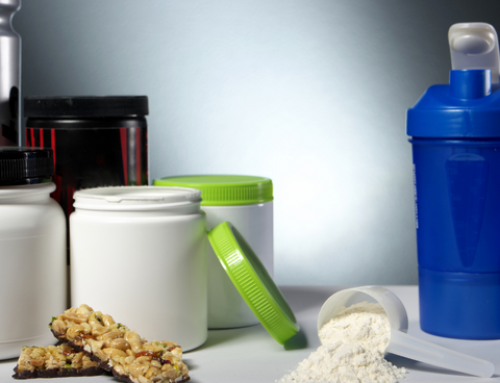7 Sketchy Marketing Phrases Used By Supplement Companies
Browse through a supplement store and you’ll see common themes: bottles plastered with 6-pack abs, huge biceps and generic slogans, such as “Get Ripped,” “Build 100% More Muscle,” and “Cut Weight Fast.” The products claim incredible results, usually in a crazy-short time.
So if you purchase the supplement, you’ll end up looking like the guy or gal on the bottle, right? Maybe, if it’s a quality supplement and you commit to a sound training and diet program. Many supplements are great, but there are bad apples that rely on gimmicks to appeal to consumers.
To help you make informed supplement choices, we spoke to three experts in the nutrition and supplement field to identify common marketing strategies that you should be wary of when choosing a supplement.
“All Natural”
“This term tends to lead people to believe that the product is inherently healthier, when in fact, it is utterly meaningless,” states Brian St. Pierre, MS, RD, CSCS, sports dietitian and nutrition coach at Precision Nutrition. “Natural is a mostly unregulated term with no real teeth to it.” For example, a compound like arsenic is “all natural,” but consuming it could kill you. That’s an extreme example, but the message is the same: “All natural” doesn’t make a product better for you.
Before-and-After Photos
Although not a marketing term, before-and-after photos are synonymous with supplements. You see a poorly lit photo of a pasty-white, flabby guy who transforms himself into an Arnold lookalike. Problem is, these photos are often complete lies. Tim Ziegenfuss, CEO of the Center for Applied Health Sciences (Stow, Ohio) and global education director at the International Society for Sports Nutrition, says, “Bodybuilders will purposely get out of shape for the before photo, and when they focus on their diet and start training, they look like a competitive bodybuilder again.” Even worse, sometimes the “after” photos are taken before the person gains weight
“Clinically Proven”
“Just because it is ‘clinically proven’ doesn’t guarantee that it will benefit you, in your particular circumstances,” says St. Pierre. “While a study may be conducted that seems to suggest [an athlete may] benefit from a particular supplement, it may be taken completely out of context and not be applicable to the person purchasing it.”
Ziegenfuss elaborates, saying that supplement companies tend to focus on the effectiveness of individual ingredients, and not the entire product. “Unless you test your final formula, the ‘clinically proven’ moniker is patently false,” he says. “The ingredients may be proven, but the combination may not. There could be an interaction. One ingredient could negate the effects of the other.”
RELATED: Safe Muscle-Build Supplements That Actually Work
“Effective”
A supplement may be effective, but that doesn’t make it OK to consume, says Sara Haas, a registered dietitian and chef. “The word ‘effective’ can sometimes be a red flag in terms of safety.” For example, steroids are effective, but they’re not safe or legal. She recommends referring to websites like SupplementWatch.com to ensure the supplements you consume are both effective and safe.
“Guaranteed”
“Be wary of any supplement that makes a promise that sounds too good to be true, because it probably is,” says Haas. It’s impossible to guarantee that taking a supplement will lead to a specific fitness result. Supplements help you achieve results, but they only support a training and diet plan. Supplement companies can only guarantee the ingredients in the product and how those ingredients affect the body. If you see a product that makes grand claims, Haas advises you to “call the company and ask them for studies (ones that they have not funded) that prove their claims.”
*”Percentage Gains”
Claims that a supplement may, for example, “burn 50 percent more fat” or “promote a 100 percent gain in lean muscle mass,” are all too common. Although the claims may be technically true, you need to look deeper. Ziegenfuss explains that a study may have one group that loses 1.5 pounds and another that loses 3 pounds. Yes, it’s a 100 percent improvement, but that’s not the entire story. “You need to look at the actual change,” Ziegenfuss advises. “The change may be very small or possibly irrelevant to body composition or performance.” The moral of the story? Don’t get caught up in crazy percentages.
“Proprietary Blend”
Supplement companies often brag about their “proprietary blends,” which are more innovative than other products. In some cases, this may be true. In others, it’s a ploy to hide the truth. Ziegenfuss explains that in the supplement industry, the “proprietary blend” label is used primarily to keep trade secrets without going through an expensive and lengthy patent process. That’s OK, unless a shady company produces the supplement. Ziegenfuss says, “Companies that misuse the proprietary blend strategy are putting a pixie-dust amount of ingredients in their formulas,” in an effort to “wow” potential buyers with the number of ingredients that will supposedly support their goal.
RELATED: 4 Creatine Myths Exposed
RECOMMENDED FOR YOU
7 Sketchy Marketing Phrases Used By Supplement Companies
Browse through a supplement store and you’ll see common themes: bottles plastered with 6-pack abs, huge biceps and generic slogans, such as “Get Ripped,” “Build 100% More Muscle,” and “Cut Weight Fast.” The products claim incredible results, usually in a crazy-short time.
So if you purchase the supplement, you’ll end up looking like the guy or gal on the bottle, right? Maybe, if it’s a quality supplement and you commit to a sound training and diet program. Many supplements are great, but there are bad apples that rely on gimmicks to appeal to consumers.
To help you make informed supplement choices, we spoke to three experts in the nutrition and supplement field to identify common marketing strategies that you should be wary of when choosing a supplement.
“All Natural”
“This term tends to lead people to believe that the product is inherently healthier, when in fact, it is utterly meaningless,” states Brian St. Pierre, MS, RD, CSCS, sports dietitian and nutrition coach at Precision Nutrition. “Natural is a mostly unregulated term with no real teeth to it.” For example, a compound like arsenic is “all natural,” but consuming it could kill you. That’s an extreme example, but the message is the same: “All natural” doesn’t make a product better for you.
Before-and-After Photos
Although not a marketing term, before-and-after photos are synonymous with supplements. You see a poorly lit photo of a pasty-white, flabby guy who transforms himself into an Arnold lookalike. Problem is, these photos are often complete lies. Tim Ziegenfuss, CEO of the Center for Applied Health Sciences (Stow, Ohio) and global education director at the International Society for Sports Nutrition, says, “Bodybuilders will purposely get out of shape for the before photo, and when they focus on their diet and start training, they look like a competitive bodybuilder again.” Even worse, sometimes the “after” photos are taken before the person gains weight
“Clinically Proven”
“Just because it is ‘clinically proven’ doesn’t guarantee that it will benefit you, in your particular circumstances,” says St. Pierre. “While a study may be conducted that seems to suggest [an athlete may] benefit from a particular supplement, it may be taken completely out of context and not be applicable to the person purchasing it.”
Ziegenfuss elaborates, saying that supplement companies tend to focus on the effectiveness of individual ingredients, and not the entire product. “Unless you test your final formula, the ‘clinically proven’ moniker is patently false,” he says. “The ingredients may be proven, but the combination may not. There could be an interaction. One ingredient could negate the effects of the other.”
RELATED: Safe Muscle-Build Supplements That Actually Work
“Effective”
A supplement may be effective, but that doesn’t make it OK to consume, says Sara Haas, a registered dietitian and chef. “The word ‘effective’ can sometimes be a red flag in terms of safety.” For example, steroids are effective, but they’re not safe or legal. She recommends referring to websites like SupplementWatch.com to ensure the supplements you consume are both effective and safe.
“Guaranteed”
“Be wary of any supplement that makes a promise that sounds too good to be true, because it probably is,” says Haas. It’s impossible to guarantee that taking a supplement will lead to a specific fitness result. Supplements help you achieve results, but they only support a training and diet plan. Supplement companies can only guarantee the ingredients in the product and how those ingredients affect the body. If you see a product that makes grand claims, Haas advises you to “call the company and ask them for studies (ones that they have not funded) that prove their claims.”
*”Percentage Gains”
Claims that a supplement may, for example, “burn 50 percent more fat” or “promote a 100 percent gain in lean muscle mass,” are all too common. Although the claims may be technically true, you need to look deeper. Ziegenfuss explains that a study may have one group that loses 1.5 pounds and another that loses 3 pounds. Yes, it’s a 100 percent improvement, but that’s not the entire story. “You need to look at the actual change,” Ziegenfuss advises. “The change may be very small or possibly irrelevant to body composition or performance.” The moral of the story? Don’t get caught up in crazy percentages.
“Proprietary Blend”
Supplement companies often brag about their “proprietary blends,” which are more innovative than other products. In some cases, this may be true. In others, it’s a ploy to hide the truth. Ziegenfuss explains that in the supplement industry, the “proprietary blend” label is used primarily to keep trade secrets without going through an expensive and lengthy patent process. That’s OK, unless a shady company produces the supplement. Ziegenfuss says, “Companies that misuse the proprietary blend strategy are putting a pixie-dust amount of ingredients in their formulas,” in an effort to “wow” potential buyers with the number of ingredients that will supposedly support their goal.
RELATED: 4 Creatine Myths Exposed










